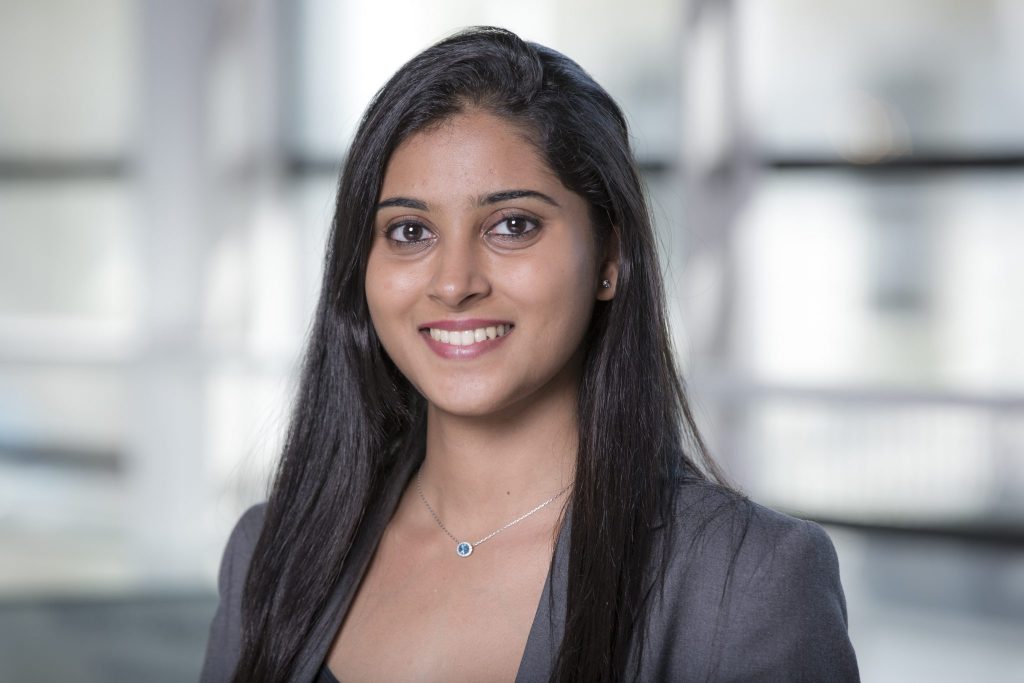Devanshi Shah will graduate with an MBA from Imperial College Business School this year. With a background in Commerce and Law, she wanted to broaden her horizons in business management. She created an app called Snaxchange, which allows people to buy and sell food which otherwise would go to waste. She believes that her company will optimise food consumption across society and have deep and lasting benefits.

Can you tell me a little about your background? What was your career before your MBA studies?
I have over five years of experience in finance, taxation, and legal consultancy, and worked with KPMG for two years.
Taxation law intrigued me, and I wanted to learn more about the different laws relating to companies. To gain some first-hand experience I worked with a law firm, where I led the team handling corporate law matters.
However, I was keen to gain a greater understanding of business management. With this in mind, I enrolled on the MBA programme at Imperial College Business School.
What is Snaxchange, and what led you to start this app?
Snaxchange helps to bridge the gap between the increasingly pressured food banks and growing levels of homelessness.
We discovered that one of the main reasons household food waste is so high is because of the lack of channels for households to redistribute surpluses of purchased food. We also found that the pressure on food industry to sell fresh food often compels them to dump large amounts of good to eat food and beverages.
Through a digital platform, Snaxchange aims to tackle these challenges by enabling users to sell, buy, or donate unwanted food and beverages, at a discounted rate, to others who can make better use of them. The aim is that the seller will be able to reduce the amount they waste and recover some of the expense. The buyer benefits from the discounted rates, and 24 hour purchasing.
Sellers list an item for buyers to search. Then app connects seller and buyer to arrange payment and delivery. Buyers can only access local sellers, and users provide ratings on each transaction, to build trust.
Users also have the option to offer, ‘for free’, items that are past their ‘best before’ date to NPOs, and food banks.
What impact do you think Snaxchange will have?
Snaxchange will optimise food consumption across society and have deep and lasting benefits.
We believe this will not only bring communities together, but provide people with a quick and easy means for reducing waste.
The platform is aimed at two groups of individuals. Firstly, people from low income groups who can re-sell food items, and buy discounted foods.
Secondly, individuals who want to solve the food wastage problem by selling or donating or donating excess food.
We want people to know that there is an alternative to food waste.
How have your MBA studies helped you build and launch this business?
My MBA allowed me to focus my knowledge to create Snaxchange. Classes such as design thinking enabled me to structure my thought process, and helped me to build confidence for an independent venture. I used what my MBA taught me in finance to model an efficient cost structure and a revenue model, and sought guidance from professors.
My MBA also gave me access to Imperial’s ‘Enterprise Lab’, which supports entrepreneurs. This helped us turn a raw ideas into a developed business plan, and assisted us in website and app creation.
Lastly, my MBA gave me the opportunity to network, further my skills in digital technology, and team management.
What is the most interesting thing you learnt from your MBA?
Through my MBA experience, I have learnt that there is more power in being humble than arrogant, and it’s good to lead through trust and collaboration. This was ingrained in me, and aligns with the values of Snaxchange.
How has your MBA helped in terms of your career and leadership journey?
My MBA allowed me to hone my leadership skills. I learnt from my professors and classmates, and the careers team gave me the opportunity to interact with experts in different fields.
Everyone involved in the MBA has always been a positive motivation for me, because no question was considered irrelevant, and no idea was considered worthless. The programme tested me every day, which led to an increased professionalism, and a dedication to achieve career goals.



